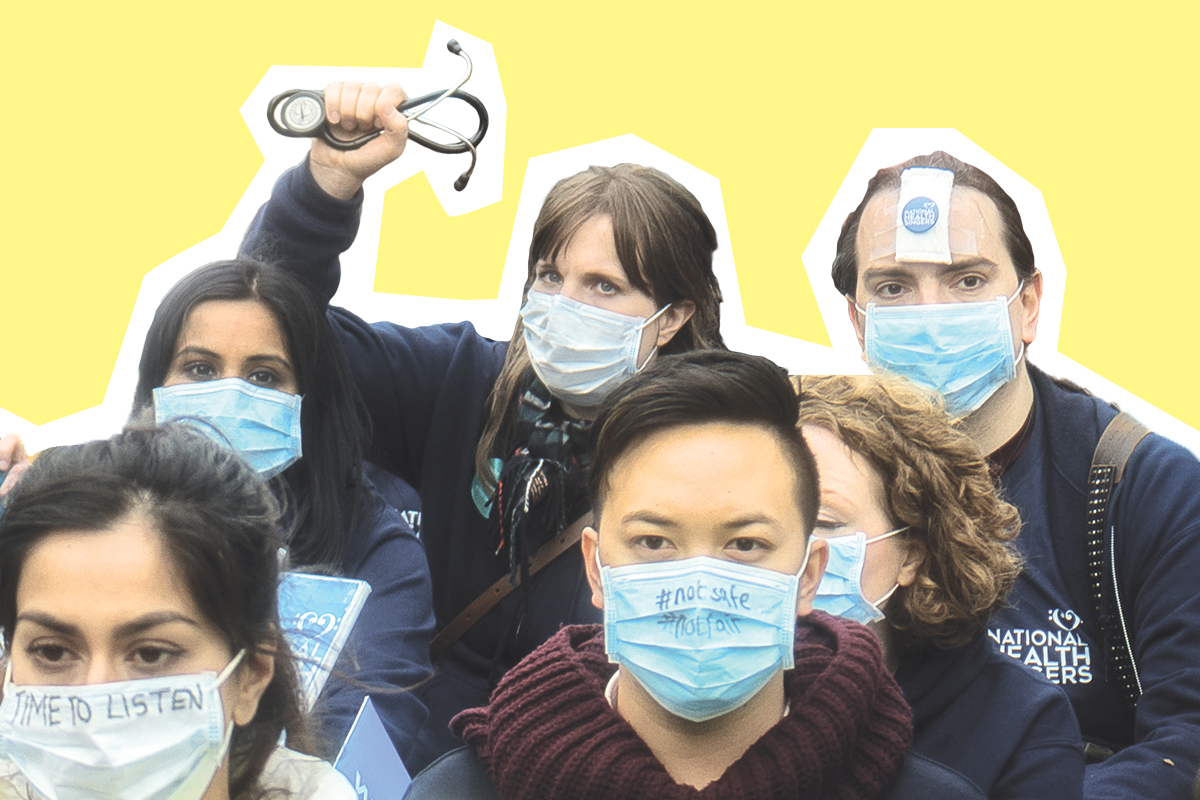While Big Pharma have made bumper profits from the pandemic, community pharmacies and frontline pharmacy workers have struggled. Public sector workers across the board need to unite and fight – to save our NHS and all vital services.
Community pharmacists in England are facing untold and unprecedented financial desperation.
While the government provided £370 million to help pharmacies stay afloat during the pandemic, statistics show that 72% of pharmacies will be in debt by 2024.
Now, in an unthinkable yet unsurprising decision, the Tories claim that this £370 million bail-out counts as debt. The National Pharmacist Association has rightly asked to have this ‘debt’ written off, or has warned that there may be moves for industrial action.
Mounting pressure
Pharmacists go largely under-appreciated as part of frontline care. And this has become even clearer during the COVID-19 pandemic.

For example, GP and dental surgeries have received bailouts from the Tory government, despite not being completely open. Yet, the government hasn’t extended this to our pharmacy colleagues, who have continued to labour under extreme pressures.
While risking their lives to battle the virus, nine-out-of-ten pharmacists (89%) say they feel at risk of burnout. This is a consequence of increased workloads, inadequate staffing, longer hours, and the loss of a work-life balance.
Meanwhile, cases of abuse directed at pharmacy staff have shot up, due to prescription delays, medicine shortages, and longer waiting times. In one case, a guard had to be employed to protect workers.
Learning through struggle
Pharmacy workers in both Northern Ireland and Scotland have previously faced similar extreme conditions.
For example, community pharmacists in Tayside went on strike for 12 weeks in 2019 over low pay, before being forced back to work. Similarly, 98% of Community Pharmacy Northern Ireland (CPNI) members voted in favour of industrial action, declaring that they had ‘reached breaking point’.
Pharmacists in England should learn from these struggles.
Workers bear the brunt

All across the frontline, workers on the ground are struggling to cope with an underfunded system during a global pandemic.
For Mo, a community pharmacist in London, an increased workload and many colleagues being ill or self-isolating “left [us] in a very vulnerable position and under a lot of stress”.
The CEO of Walgreens Boots Alliance, meanwhile, made a whopping £12.5 million last year – 340 times the average salary of a community pharmacist.
Divisions are beginning to form between workers and their bosses. “Pharmacy staff care about the quality of care; management cares about profits and cutting costs,” stated one pharmacy worker we spoke to. “That’s [why] they’re the ones who are always overworking staff, cutting hours and overtime when needed.”
These issues are nothing new, but are the result of decades of underfunding. As community pharmacist Juliana told us: “Community pharmacy has been in dire straits…and it’s only got worse, [with] more responsibilities and services and less funding from the NHS”.
In 2016, 400 pharmacies closed after £250 million worth of cuts were unleashed on the sector.
Financial chaos
Even as the end of lockdown looms on the horizon, pharmacists still fear for their jobs. Nearly half of pharmacy contractors (47%) think their pharmacy is at risk of closing within the year.
As one junior community pharmacist pointed out: “Pharmacies that rely on prescriptions as their main source of income might not survive…especially with the government refusing to provide financial support.”
While over 60% of pharmacies (outside of London) are grouped into chains of five branches or more, many operate as independent small businesses. Closing pharmacies risks the safety of their patients and the job security of employees, and puts further pressure on neighbouring pharmacies.
These repercussions will be felt heavily by workers who rely on their local pharmacy for essential medication.
Workers’ control

The Treasury ludicrously claims that the financial gap should be met by a chronically underfunded NHS. Yet the Tories have thrown billions of pounds of our money into crooked contracts – such as the failed (privately-run) test-and-trace system.
This prospect of devastation reveals the complete anarchy of the capitalist market, where even businesses offering essential and life saving medicine are not safe; where every closed pharmacy is a crushing loss for the surrounding patients.
Andrew Lane, chairman of the National Pharmacy Association struck the correct tone in a Guardian interview: “People can live without pizzas, but they can die without their pills and the healthcare we provide”.
It’s clear that the Tories and their corrupt cronies have the blood on their hands. They are not interested in saving lives.
The only way forward is for a strike across the entire public sector. After all, the failures to deal with this crisis have been felt across the board. Every death is a crime – whether caused by COVID-19, the grinding halt of services, or a closed pharmacy.
Only the working class can take control of this situation. The NHS should be brought back under full public ownership and control, and placed into the hands of healthcare workers. And we need to nationalise the big pharmaceutical companies, without compensation.
Only then can the enormous resources that exist in society actually be put towards human needs.






